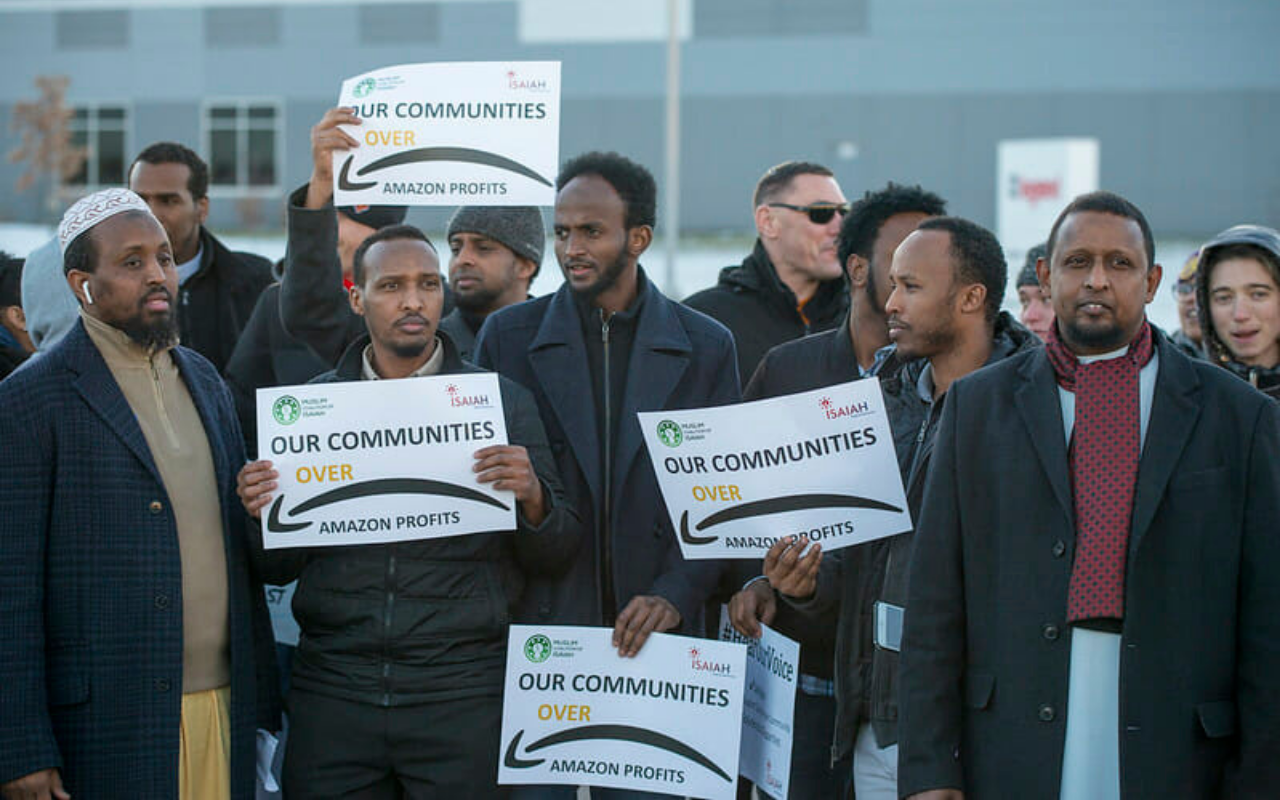The Amazon workers in Shakopee, Minnesota, have long been a thorn in the side of the online shopping giant. Employees at the MSP1 warehouse — about 30 percent of whom are East African immigrants — made headlines in 2018 when their protests led to Amazon’s first concessions for U.S. workers.
The Awood Center, a worker support group based in Minneapolis, was a critical ally back then — and still is, as the Shakopee Amazon workers continue to organize during the pandemic.
With Americans spending more on e-commerce for health reasons, Amazon sales and profits have skyrocketed. And while pandemic windfalls have boosted the personal fortune of Amazon CEO Jeff Bezos, the crisis has put even more stress on frontlines workers.
Awood Executive Director Abdirahman Muse and Amazon workers Mohamed Mire and Nimo Hirad spoke recently about these challenges with staff of the Institute for Policy Studies. On October 15, the Awood Center will receive the Institute’s annual Letelier-Moffitt Human Rights Award.
“Workers are constantly worried about getting exposed to Covid, not getting the treatment they need, and bringing it home to their families,” Muse explained.
After the first workers in the Shakopee warehouse tested positive for Covid-19 in late April, at least 25 of their colleagues walked off their shift. One of their key demands was an extension of unpaid time off for workers who didn’t feel safe in the workplace or needed to stay home during the pandemic for family reasons.
Their concerns were hardly unfounded. On October 1, Amazon announced that 19,816 of its frontline workers across the country had tested positive for the virus.
Amazon warehouse workers also face intense everyday physical stress. The Shakopee facility employs roughly 1,000 workers who collect and pack items that zip down a conveyor belt at dizzying speeds.
“When I applied for the job, they said I wouldn’t have to lift anything heavier than 50 pounds,” said Nimo Hirad. “After I was hired I had to lift as much as 80 pounds.”
When Hirad and other women began participating in protests over working conditions, she started getting called into the management office and interrogated.
“We’re not treated as human beings,” she said. “They treat us like robots.”
According to In These Times, the Shakopee facility has one of the highest injury rates among Amazon’s warehouses.
To tighten the screws on employees, Amazon uses an automated monitoring system called “time off task,” which sends workers warnings when they’ve spent too long away from their assignment. The requirements are so stringent that workers take fewer bathroom breaks — bathrooms are often far from workspaces — in order to avoid possible disciplinary action or termination.
Mohamed Mire, who has worked for Amazon for three years, shared that he often has to work a 10-hour shift with just two short breaks.
“When I come home, I’m too tired to hug my kids,” Mire said. “I just want to go to bed. We’re fighting against a machine but we can’t win because we are human beings.”
On October 1, more than 35 Shakopee workers staged yet another walkout to protest the alleged firing of a female employee for “time off task” violations after she had voiced concerns about safety protections.
The Awood Center is demanding that the employee be reinstated, pointing out that the company has used similar excuses for targeting other worker leaders who’ve spoken up about health and safety conditions.
Rep. Ilhan Omar spoke at the 2018 walkout rally outside the Shakopee warehouse and has continued to be a strong ally of the Awood Center and the Amazon workers in her “Minnesota backyard.”
In response to Awood receiving the Letelier-Moffitt Award, Omar said they are extremely worthy because they are “using bold and creative ways to energize people to believe in themselves and to believe in the power within their communities. They are not only changing the conversation of what organizing in the labor movement looks like right now but also the narrative about what should be the power of immigrants in workplaces in this country.”
Rep. Pramila Jayapal, who worked with Muse in her days as an immigrant rights leader, will present the award, which is named after Orlando Letelier and Ronni Karpen Moffitt, Institute for Policy Studies colleagues who were assassinated in 1976 by agents of Chilean dictator Augusto Pinochet.
“I’ve never believed that change happens because legislators decide to do the right thing,” Japayal said. “We need groups like Awood that are standing up for workers and taking on the fights of equity and justice that are sometimes controversial but are so critical to moving the ball forward.”
